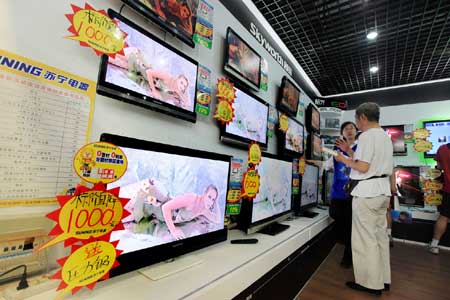-
News >Bizchina
Economists urge focus on domestic consumption
2010-06-25 09:48
NEW YORK / BEIJING - American economists are urging the Chinese government to strengthen efforts to spur domestic consumption in order to help ensure the sustainability of China's economic growth and maintain the balance of trade.
A customer shops for a flat-screen TV at a store in Beijing. An increase in consumption is vital for China's growth. A Qing / For China Daily
While applauding the efforts China has made in transforming from an export-orientated to a consumption-led economy, academics and senior researchers from the United States said there is still a large gap for the world's most populous nation to fill to bring domestic consumption into full play.
"An increase in consumption is for China's growth, and an increase of consumption helps reduce global imbalances," said Rachel Ziemba, a senior economist on China issues with Roubini Global Economics.
For three decades, China's economic growth has been fundamentally supported by the double-digit growth in exports and huge amounts of fixed-asset investments, but this scenario may soon become history. Global economic growth has entered the doldrums and there is no indication this will change for the better following the risky European debt crisis and widespread unemployment in the US.
"One of the challenges that China faces, and other exporting nations face as well, is the need to consume more in the region," said Ziemba.
Since the latter half of last year, China's imports have increased sharply driven by the government's stimulus package, but actually, "China is still very reliant on exports as a certain number of imports are for re-export", said Ziemba.
For Nouriel Roubini, chairman of Roubini Global Economics and also professor of economics at New York University, the traditional model of China for decades of "a weak currency and export-led growth", only works when the US and the other countries continue spending and buying. Roubini said that this model of growth is either broken or highly challenged, because China's previous customers - the over-spending nations of the West - are spending less and saving more. So the question facing China is how it can continue to achieve growth under those circumstances?
"That model of growth has to be changed (into) more reliance on domestic consumption," Roubini said.
China has to undergo an economic transformation as the two main importers - the US and the EU - reduce their purchases from China.
On that theme, US President Barack Obama announced in March that the US would double its exports within five years and create huge numbers of jobs. Meanwhile, the European debt crisis is still going on and is expected to worsen in the coming months.Shifting China's focus to bolstering domestic consumption is also favored by other nations. Since the financial crisis broke out, developed nations have been wagging their fingers at leading exporters such as China, Germany and Japan, blaming them for global trade imbalances.
For Barry Bosworth, senior fellow of the economic studies program with the Brookings Institute, China's economy has been out of balance since 2003 or 2004 when imports leveled out as a share of GDP and exports went right on growing.
"You can't have big countries running big surpluses. You need balance. It is not fair to the others," Bosworth said.
"We should be focusing on what China can do to increase demand in domestic consumption responsibly."
